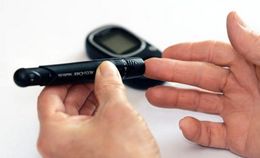Virtually all of us have heard about the obesity "epidemic" (it's not contagious, by the way), but what about metabolic syndrome? A lesser known phenomenon, metabolic syndrome is a collection of conditions related to obesity that are typically treated separately with prescription drugs. Metabolic syndrome is almost as common in the US population as obesity: 24% in women and 22% in men. And just like obesity, rates have grown parallel with poor diet and a sedentary lifestyle.
In order to be diagnosed with metabolic syndrome, 3 of the following 5 conditions must be present:1
- Blood sugar higher than 100
- Blood pressure higher than 130/85
- Triglycerides higher than 150
- HDL cholesterol (the "good" cholesterol) lower than 40 in men or 50 in women
- A waist circumference greater than 40 - for men or 35 - for women (slightly less for Asian men and women)
Why is waist circumference mentioned rather than obesity? Body fat in the abdomen area is considered more dangerous than fat distributed elsewhere because vital organs like the liver and pancreas are located in the abdominal cavity.
Metabolic syndrome is strongly related to insulin resistance, which occurs when cells in the muscles, body fat and liver start ignoring the signal being sent out by the hormone insulin to pull glucose out of the bloodstream and into the cells.
Why should metabolic syndrome be addressed early on?
A recently published large study of more than 27,000 individuals found that insulin resistance was evident more than 20 years before an eventual diagnosis of diabetes or pre-diabetes.2
This means that if you have metabolic syndrome, even without a current diagnosis of pre-diabetes you are likely on the path to pre-diabetes and diabetes. So, the time to act is now!
How is metabolic syndrome treated in conventional medicine?
Early treatment of metabolic syndrome usually includes a recommendation to modify diet and lifestyle. However, occasional and very brief visits to the doctor are typically not the best context for conversations about these preliminary steps. This is because many people face major challenges with changing their eating and exercise habits.
With progression of metabolic syndrome, as many as 5 conditions may be involved, so each tends to be treated with separate medicines. This means people diagnosed with metabolic syndrome may be taking multiple prescription drugs for each of blood sugar management, blood pressure, triglycerides and cholesterol.
In addition to prescription drugs, bariatric surgery is increasingly being recommended as a treatment for obesity, even for teens.3 It goes without saying that major surgery like this comes with inherent risks.
Are drugs or surgery the only solutions?
Usually not! There is growing evidence that metabolic syndrome can be reversed, mainly through long-term weight management and lifestyle changes. That's the good news. But of course this is not a quick-fix solution.
Many with metabolic syndrome have tried every "diet", having lost and regained the excess weight over and over again. This is because unless insulin resistance, the underlying cause of metabolic syndrome-- is halted, the weight creeps back because the original metabolic imbalance has not been addressed.
There is also growing evidence indicating that success in weight management is increased with a personalized approach that takes into account eating patterns, preferences, metabolic goals and comorbidities (or other conditions).4
Michael Dansinger, MD Director of the Diabetes Reversal Program at Tufts Medical Center, emphasizes the benefit of coaching assistance: "I suspect that having a good coach can quadruple the odds of long-term success compared to going it alone. It is just too hard to police yourself without help". 5
What have you done to address metabolic syndrome?
References:
1 https://emedicine.medscape.com/article/165124-overview
2 https://www.sciencedaily.com/releases/2018/10/181004192202.htm
4 https://www.thelancet.com/action/showPdf?pii=S2213-8587%2819%2930149-4
5 https://www.bostonmagazine.com/sponsor-content/80-of-diabetics-can-reverse-their-disease-heres-how/











